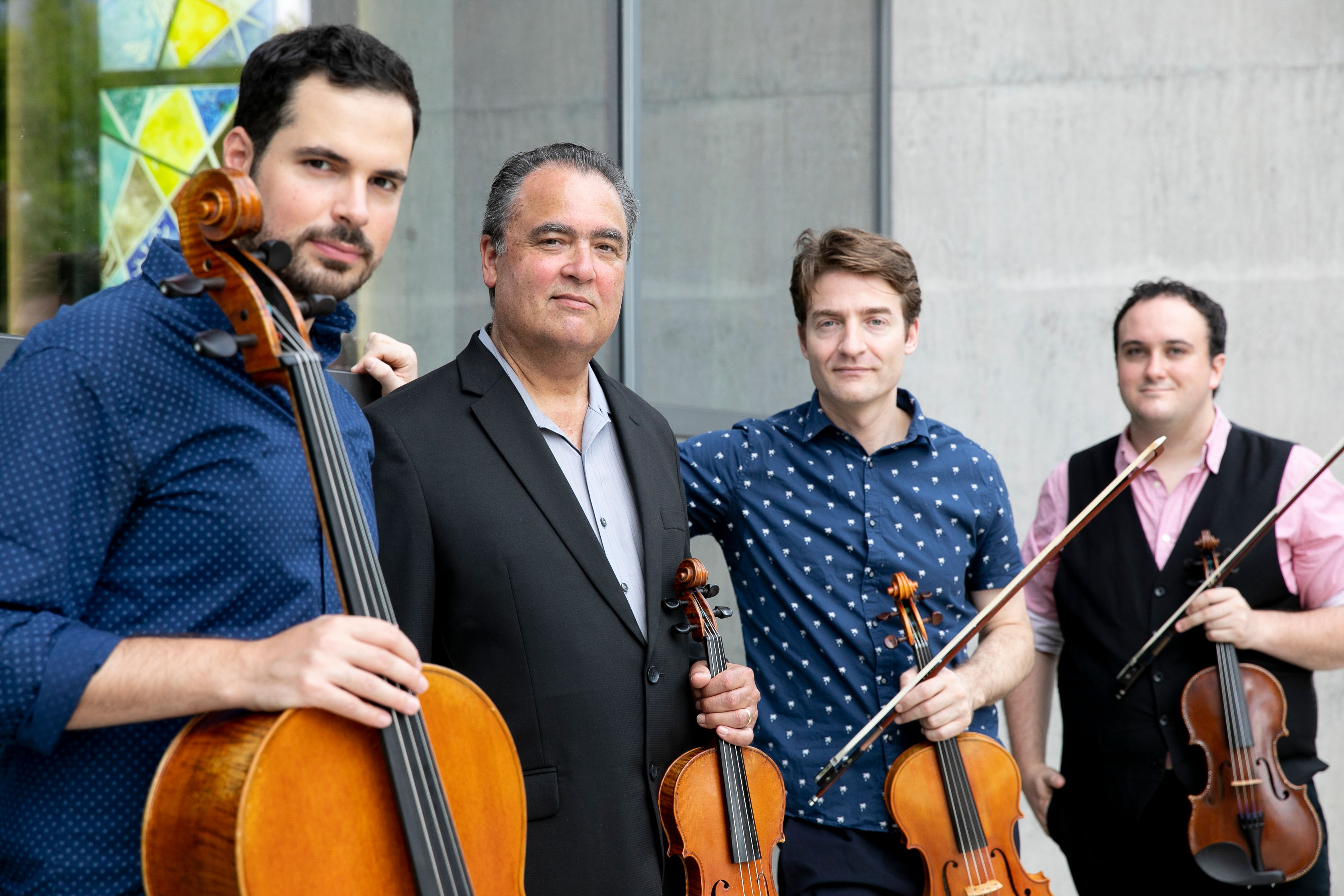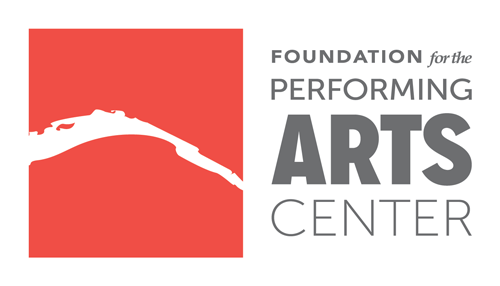
Gabe Terracciano, Violin
David Balakrishnan, Violin, Artistic Director
Benjamin Von Gutzeit, Viola
Naseem Alatrash, Cello
DAVID BALAKRISHNAN (b. 1954)
Little Mouse Jumps
RHIANNON GIDDENS (b. 1977)
Pompey Ran Away *
JEROD IMPICHCHAACHAACHA’ TATE (b.1968)
Little Loksi' *
DAVID BALAKRISHNAN
Island Prayers *
I. Dialog
II. Atonement
III. Redemption
- INTERMISSION -
DAVID BALAKRISHNAN
Groove in the Louvre
Darkness Dreaming
TERENCE BLANCHARD (b. 1962)
Turtle Trajectory *
DAVID BALAKRISHNAN
The Second Wave
*Co-Commissioned By:
- Lincoln Center for the Performing Arts
- Meany Center for the Performing Arts
- The Music Hall, Portsmouth
- Savannah Music Festival
- Schwartz Center for the Performing Arts - Emory University
Since its inception in 1985, the Turtle Island Quartet has been a singular force in the creation of bold, new trends in chamber music for strings. Winner of the 2006 and 2008 Grammy Awards for Best Classical Crossover Album, Turtle Island fuses the classical quartet esthetic with contemporary American musical styles, and by devising a performance practice that honors both, the state of the art has inevitably been redefined. Cellist nonpareil Yo-Yo Ma has proclaimed TIQ to be “a unified voice that truly breaks new ground — authentic and passionate — a reflection of some of the most creative music-making today.”
The Quartet’s birth was the result of violinist David Balakrishnan’s brainstorming explorations and compositional vision while completing his master’s degree program at Antioch University West. The journey has taken Turtle Island through forays into folk, bluegrass, swing, be-bop, funk, R&B, new age, rock, hip-hop, as well as music of Latin America and India...a repertoire consisting of hundreds of ingenious arrangements and originals. It has included over a dozen recordings on labels such as Windham Hill, Chandos, Koch, Telarc, Azica and Blue Note, soundtracks for major motion pictures, TV and radio credits such as the Today Show, All Things Considered, Prairie Home Companion and Morning Edition, feature articles in People and Newsweek magazines, and collaborations with famed artists such as trumpeter Terence Blanchard, clarinetist Paquito D’Rivera, vibraphonist Stefon Harris, guitar legends such as Leo Kottke and the Assad brothers, The Manhattan Transfer, pianists Billy Taylor, Kenny Barron, Cyrus Chestnut and Ramsey Lewis, singers Tierney Sutton and Nellie McKay, the Ying Quartet and the Parsons and Luna Negra Dance Companies.
Another unique element of Turtle Island is their revival of venerable improvisational and compositional chamber traditions that have not been explored by string players for nearly 200 years. At the time of Haydn’s apocryphal creation of the string quartet form, musicians were more akin to today’s saxophonists and keyboard masters of the jazz and pop world, i.e., improvisers, composers and arrangers. Each Turtle Island member is accomplished in these areas of expertise.
As Turtle Island members continue to refine their skills through the development of repertory by some of today’s cutting edge composers, through performances and recordings with major symphonic ensembles, and through a determined educational commitment, the Turtle Island Quartet stakes its claim as the quintessential ‘New World’ string quartet of the 21st century.
The inception of this project coincided with the start of the pandemic. My piece, “Second Wave,” had just been recorded for Terence Blanchard’s Blue Note release Absence, and Terence’s unwavering support of my writing gave me the confidence to imagine a return to the original vision of Turtle Island Quartet — a group that performed my original music, along with other original works by Jazz and American Roots composers.
When we started thinking of how to best announce this renewed identity for the quartet to the world, we knew that the statement had to be on a grand scale, and that the voices needed to be both artistically expansive and revered. Terence Blanchard had just received his second Academy Award nomination for Best Original Score, and it had been recently announced that his second opera, Fire Shut Up in My Bones, would be staged at the Metropolitan Opera. Rhiannon Giddens had been named the new Artistic Director of Silk Road Ensemble and the rescheduling of the premiere of her now Pulitzer Prize winning opera, Omar, was imminent. Jerod Impichchaachaaha’ Tate’s Ghost of the White Deer had premiered with Dallas Symphony, which inspired me to listen to recordings of his compositions, including to his powerful work Iholba, featuring the San Francisco Symphony and Symphony Chorus.
In addition to the intense gravitational pull from these massive works, all three voices naturally coalesce around a broader idea: that for the highest achieving individuals, “classical music” is now no longer confined to traditional expectations, even in its original forms. It was intentional that we found one voice each to represent jazz, folkloric and new music, but that each voice had broad stylistic influences beyond the preconceived limits of their genre, in this case ranging from West African, Caribbean and Indigenous cultures. What we wanted to show is that even these three primary stylistic pillars, which all happen to find their way in my writing as well, were not contained to one exclusive artistic or cultural subset. As a result, we have quite naturally built a program that not only compliments my original works, but truly reflects the history and essence of “Turtle Island,” the borrowed name for North America, based on many creation myths of the people who have been in the United States for millennia. In this context, Turtle Island is a place or idea where traditions and cultures merge into this gorgeous, cohesive, compelling mosaic that happens most naturally in music and through the vehicle of the string quartet.
The title Island Prayers came from the revelation that the deep connection live performance has to the human psyche is only paralleled by spiritual practice — through both the rituals of performing arts and spiritual celebration are our most profound and meaningful human characteristics engaged: community, reflection and collective imagination. What we present here are works both meditative and celebratory — “Prayers,” if you will, for the continued future of this new, exciting paradigm.
— David Balakrishnan, Artistic Director and Composer
Little Mouse Jumps
DAVID BALAKRISHNAN
The title is taken from a Native American sacred story in which the main character lives in a community where he doesn’t feel like he belongs — he is a misfit. He embarks on a spiritual journey to find the “Sacred Mountain.” At one point, he comes to an impossibly wide river, which blocks his way. In order to cross and to get a glimpse of the Sacred Mountain, he must jump higher than he ever has before, into the complete unknown.
Pompey Ran Away
RHIANNON GIDDENS
Pompey Ran Away — listed as a “Negroe Jig” in the Selection of Scotch, English, Irish and Foreign Airs, Volume 1, from the collection of Alexander Wood Inglis of Scotland — is a repetitive, trance-like snippet of sound from a time in the late 1800s that is hard for us to fathom. In this piece Pompey is a fiddler — many enslaved people who self-emancipated during this time would have had to have a skill, and being a fiddler was highly prized, and we follow his journey through the American landscape.
This piece captures the essence of American Fiddle Music — the techniques, harmonies and voicings, and rhythms all harken to a tradition quintessentially American that was derived from many original sources and cultures. These same techniques have vastly influenced the techniques and works written by Turtle Island Quartet.
Vignette 1: “...is remarkably fond of playing the fiddle”
Vignette 2: “Pompey ran...”
Vignette 3: “...he stammers some, in talking, and always says mar instead of but...”
Vignette 4: “...is extremely fond of frolicking”
Vignette 5: “...they call him GODBOLD”
Vignette 6: “He pretends to be free, and perhaps by that means may procure a pass...”
Vignette 7: “...took his fiddle with him”
Little Loksi’
JEROD IMPICHCHAACHAAHA’ TATE
Little Loksi’ is a rhapsodic composition based upon the book of the same title by Chickasaw author, Trey Hays. In this story, Little Loksi’ (little turtle) is on a daily adventure with his parents. Turbulent weather causes him to be turned over on his back, from which he cannot recover. Nashoba (wolf) takes the lead in finding woodland animals that might be able to help Little Loksi’ turn back over. Through a lively adventure of finding his neighbors to help, Nashoba aids his precious community in pooling all of their unique talents, ending in a glorious success. The animals conclude their adventure with a stomp dance, celebrating their teamwork.
I have a beautiful and blessed life as a Chickasaw composer, because I have the privilege of expressing our culture and stories through classical composition. This work is deeply informed by our Southeastern American Indian melodies, and it is a favorite story of my son, Heloha (thunder).
— Jerod Impichchaachaaha’ Tate
Island Prayers
DAVID BALAKRISHNAN
Closer to the end of the journey than the beginning, I find much gratitude in having been granted the precious gift of a lifetime in music. In my younger days, I yearned to attain an indisputable expert level that I could hold onto. But the cross-genre path made it nigh impossible, since every style I was drawn to explore, there was a pinnacle of achievement that I would sense was a trap, compelling me to change direction.
Similarly, in the process of composing this music, the imperative to come up with something heroic or noble as befitting the theme was causing me to get in my own way. Dropping that, I focused in on channeling the feelings the intent of the program brought up in me, and let the piece write itself.
Groove in the Louvre
DAVID BALAKRISHNAN
The wordplay in this title refers to a treasured memory of a time when my wife and I toured the iconic Louvre Museum. Afterwards we walked the streets of Paris basking in a most unbelievable multicultural experience in this grand cosmopolitan city. In this setting, in which history could not be lost, we stumbled upon Moreno, a guitarist, performing in a small tent directly across from the Louvre. Here was a taste of the thriving Paris jazz scene of the 1930s in a modern day surrounding. It was a glorious juxtaposition of worlds.
Darkness Dreaming
DAVID BALAKRISHNAN
The melodic and harmonic material of Darkness Dreaming is derived from an Indian scale known as the “Todi Raga,” believed to have originated in Rajasthan, a region of Northern India also known as the ancestral homeland of the European Gypsies (Roma). The Rajasthani culture is renowned for their artistic tradition of miniatures, in which they give the ragas human form and character — in this case the raga is depicted as “Ragini Todi,” a “lovesick woman who attracts the deer.” An Indian audience listening to a successful performance of this raga would experience a mood of “delighted adoration in a gentle, loving sentiment.”
Turtle Trajectory
TERENCE BLANCHARD
When Terence Blanchard invited the quartet to join him for his 2021 album Absence, a bond was created that continues to grow and evolve after 70 performances together. Over this time, Blanchard has had the opportunity to hear all that makes this quartet unique and has become a vital influence and inspiration for the group. This work is written with their signature sound and techniques in mind, a true celebration of their artistic legacy and future.
The Second Wave
DAVID BALAKRISHNAN
The Second Wave was inspired by the 2003 tsunami disaster in South Asia that struck my family’s ancestral homeland. It is an attempt to convey both the awesome majesty of water as well as the powerlessness and surrender that comes with facing life-changing events of any sort, nature or man-made.


.png)
